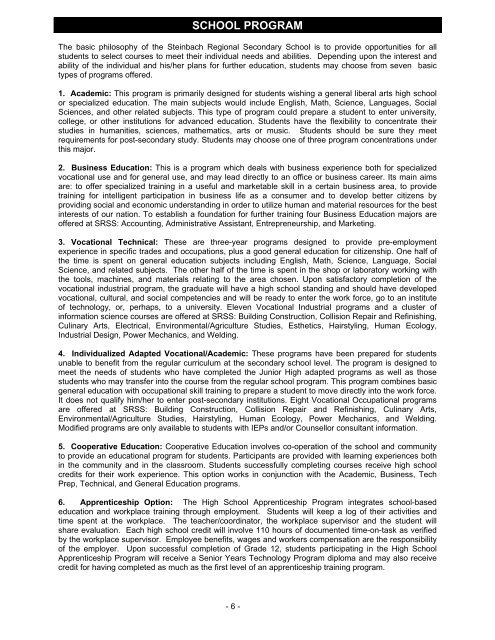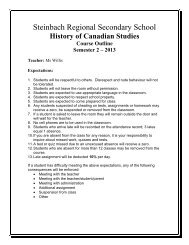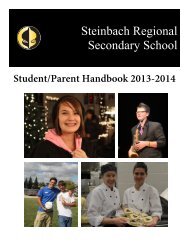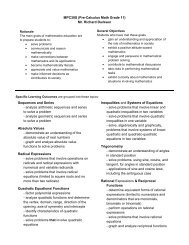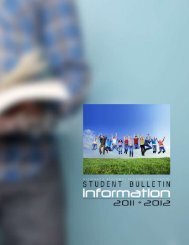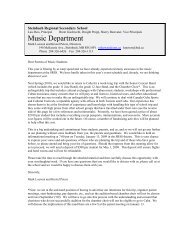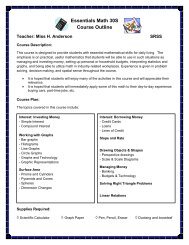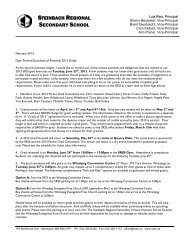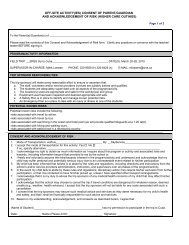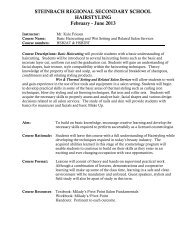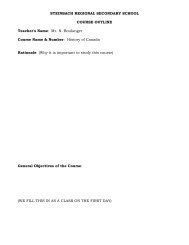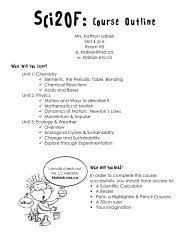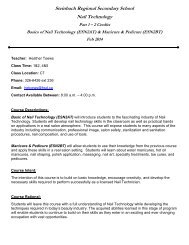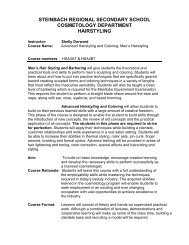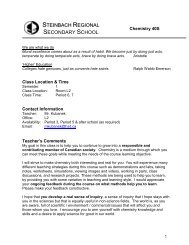SRSS Handbook 2012_13.pdf - Steinbach Regional Secondary ...
SRSS Handbook 2012_13.pdf - Steinbach Regional Secondary ...
SRSS Handbook 2012_13.pdf - Steinbach Regional Secondary ...
Create successful ePaper yourself
Turn your PDF publications into a flip-book with our unique Google optimized e-Paper software.
SCHOOL PROGRAM<br />
The basic philosophy of the <strong>Steinbach</strong> <strong>Regional</strong> <strong>Secondary</strong> School is to provide opportunities for all<br />
students to select courses to meet their individual needs and abilities. Depending upon the interest and<br />
ability of the individual and his/her plans for further education, students may choose from seven basic<br />
types of programs offered.<br />
1. Academic: This program is primarily designed for students wishing a general liberal arts high school<br />
or specialized education. The main subjects would include English, Math, Science, Languages, Social<br />
Sciences, and other related subjects. This type of program could prepare a student to enter university,<br />
college, or other institutions for advanced education. Students have the flexibility to concentrate their<br />
studies in humanities, sciences, mathematics, arts or music. Students should be sure they meet<br />
requirements for post-secondary study. Students may choose one of three program concentrations under<br />
this major.<br />
2. Business Education: This is a program which deals with business experience both for specialized<br />
vocational use and for general use, and may lead directly to an office or business career. Its main aims<br />
are: to offer specialized training in a useful and marketable skill in a certain business area, to provide<br />
training for intelligent participation in business life as a consumer and to develop better citizens by<br />
providing social and economic understanding in order to utilize human and material resources for the best<br />
interests of our nation. To establish a foundation for further training four Business Education majors are<br />
offered at <strong>SRSS</strong>: Accounting, Administrative Assistant, Entrepreneurship, and Marketing.<br />
3. Vocational Technical: These are three-year programs designed to provide pre-employment<br />
experience in specific trades and occupations, plus a good general education for citizenship. One half of<br />
the time is spent on general education subjects including English, Math, Science, Language, Social<br />
Science, and related subjects. The other half of the time is spent in the shop or laboratory working with<br />
the tools, machines, and materials relating to the area chosen. Upon satisfactory completion of the<br />
vocational industrial program, the graduate will have a high school standing and should have developed<br />
vocational, cultural, and social competencies and will be ready to enter the work force, go to an institute<br />
of technology, or, perhaps, to a university. Eleven Vocational Industrial programs and a cluster of<br />
information science courses are offered at <strong>SRSS</strong>: Building Construction, Collision Repair and Refinishing,<br />
Culinary Arts, Electrical, Environmental/Agriculture Studies, Esthetics, Hairstyling, Human Ecology,<br />
Industrial Design, Power Mechanics, and Welding.<br />
4. Individualized Adapted Vocational/Academic: These programs have been prepared for students<br />
unable to benefit from the regular curriculum at the secondary school level. The program is designed to<br />
meet the needs of students who have completed the Junior High adapted programs as well as those<br />
students who may transfer into the course from the regular school program. This program combines basic<br />
general education with occupational skill training to prepare a student to move directly into the work force.<br />
It does not qualify him/her to enter post-secondary institutions. Eight Vocational Occupational programs<br />
are offered at <strong>SRSS</strong>: Building Construction, Collision Repair and Refinishing, Culinary Arts,<br />
Environmental/Agriculture Studies, Hairstyling, Human Ecology, Power Mechanics, and Welding.<br />
Modified programs are only available to students with IEPs and/or Counsellor consultant information.<br />
5. Cooperative Education: Cooperative Education involves co-operation of the school and community<br />
to provide an educational program for students. Participants are provided with learning experiences both<br />
in the community and in the classroom. Students successfully completing courses receive high school<br />
credits for their work experience. This option works in conjunction with the Academic, Business, Tech<br />
Prep, Technical, and General Education programs.<br />
6. Apprenticeship Option: The High School Apprenticeship Program integrates school-based<br />
education and workplace training through employment. Students will keep a log of their activities and<br />
time spent at the workplace. The teacher/coordinator, the workplace supervisor and the student will<br />
share evaluation. Each high school credit will involve 110 hours of documented time-on-task as verified<br />
by the workplace supervisor. Employee benefits, wages and workers compensation are the responsibility<br />
of the employer. Upon successful completion of Grade 12, students participating in the High School<br />
Apprenticeship Program will receive a Senior Years Technology Program diploma and may also receive<br />
credit for having completed as much as the first level of an apprenticeship training program.<br />
- 6 -


